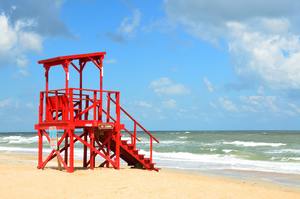 The summer holidays are approaching fast and are a great time for the family to get away from the cold, dark days of winter and have some fun in the sun. Keep your family safe while on your break by following these tips.
The summer holidays are approaching fast and are a great time for the family to get away from the cold, dark days of winter and have some fun in the sun. Keep your family safe while on your break by following these tips.
Sunburn
Skin cancer is the most common cancer in Ireland amongst both men and women. A tan or sunburn may go away but the sun damage to your skin is permanent. It builds up every year and can lead to skin cancer in later life.
Choose a sunscreen that is at least SPF 30 and apply it 15 to 30 minutes before going outside. Sunscreen should be applied every two hours (or so) and after swimming or vigorous activity (anything that causes you to sweat a lot).
Here some tips from www.cancer.ie
- Plan outdoor events so that your child is indoors as much as possible between 11am and 3pm. Encourage children to play in the shade when they are outdoors.
- Dress your child in loose-fitting outfits with long sleeves and long shorts. Make sure they are made from close-woven material.
- Dress your child in a wide-brimmed hat which protects the neck, ears and face. A hat that ties under your child’s chin may stop them from taking it off.
- Use sunglasses to protect your child’s eyes.
- Babies under 6 months of age should be kept out of direct sunlight. Move your baby to the shade under a tree, umbrella or stroller canopy. It is okay to apply a small amount of sunscreen on infants under 6 months if there is no way to avoid the sun.
- Dress babies in lightweight clothing that covers the arms and legs and use brimmed hats.
Hydration
Did you know that if you’re feeling thirsty, you’re already mildly dehydrated? Relying on thirst as a reminder to take a drink leaves you and your child at risk for dehydration.
The following symptoms can indicate that a child is dehydrated:
- Dizziness
- Dry mouth
- Cessation of sweating
- Irritability
- Lethargy
- Fatigue
- Dark yellow urine
- Anuria (lack of urine) for 12 hours (or 6 hours for infants)
- Tearless crying
- Sunken eyes
Help kids avoid becoming dehydrated by reminding them to drink often throughout the day. The American Academy of Paediatrics (AAP) recommends drinking about every 20 minutes if kids are active in sports.
Water and sports drinks are the best options for hydrating kids — avoid fizzy drinks, juice and other fruit drinks.
Food Poisoning
Summertime offers so many gorgeous days for picnicking and barbecues. But don’t let the heat ruin your outing — food-borne illnesses are caused by bacteria (such as E.coli, Salmonella), viruses, parasites and other toxins.
One of the best ways to avoid food poisoning during the summertime is to be sure food items that contain mayonnaise, milk, eggs, meat, poultry and seafood aren’t kept at room temperature for more than an hour or two.
“Keep hot food hot and cold food cold.”
When you are packing food for a picnic, place cold food in a cooler with plenty of ice. Cold food should kept in the cooler which should be stored in shade. Hot food should be wrapped well and placed in an insulated container.
Those hit by a foodborne illness must stay hydrated so they could try chewing on ice cubes or sipping clear fluid after vomiting has stopped. In the next day or so, eat only light foods such as bananas, rice, toast, crackers and soup. Seek emergency treatment if severe pain accompanies the illness, if vomiting doesn’t stop in a couple of hours, or if bloody diarrhoea is experienced.
Water safety
Did you know that on average 150 people drown in Ireland each year? Most of these tragic deaths happen inland, in rivers and lakes, on farms and in and around homes and these accidents are preventable.
Never leave kids alone near the pool no matter what their ages or swimming capabilities are. Very young children can drown in just an inch of water!
Parents should closely supervising kids while they swim or play near a pool.
Wearing a personal floatation device while boating can save your life. There are specific regulations for life jackets, for adults and kids. Be sure it has a snug fit — snug enough to stop a kid’s ears or chin from slipping through
Empty all buckets, inflatable paddling pools and bathtubs completely after each use – do not leave them full and unattended.
Always have ADULTS supervising young swimmers.
Don’t mix alcohol and supervision of children.
Be sure that the adult watching your child knows how to swim, get emergency help and perform CPR.








